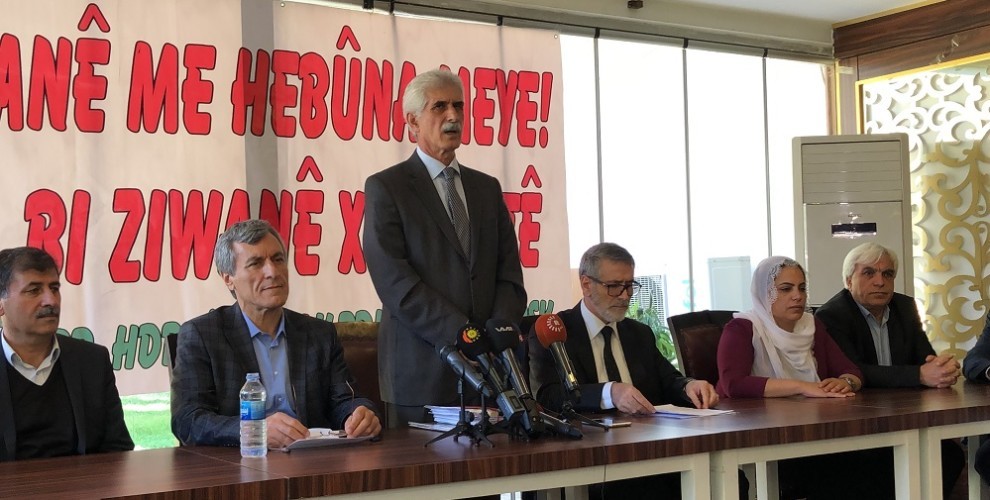Kurdish Language Platform presented Final Document
After the weekend workshop in Amed, the Kurdish Language Platform presented its final document to turn Kurdish language an issue at the top of Kurdish society’s agenda.
After the weekend workshop in Amed, the Kurdish Language Platform presented its final document to turn Kurdish language an issue at the top of Kurdish society’s agenda.

Peoples’ Democratic Party (HDP), Democratic Regions Party (DBP), Freedom and Socialism Party (OSP), Kurdistan Democratic Party-Bakur (KDP-B), Kurdistan Democratic Party- Turkey (KDP-T), Kurdistan Socialist Party (PSK), Kurdistan Freedom Party (PAK), Human and Freedom Party and Azadi Movement established a Kurdish Language Platform.
At the weekend a workshop was held in Amed and the final declaration has been presented at a press conference at the Association of Southeastern Journalists (GGC).
The final document redacted at the workshop was read by Bayram Bozyel, Deputy Chair of PSK, in Kurmancî, and by lawyer Sıtkı Zilan, Political Affairs representative of the Azadi Movement in Kirmanckî.
The final document underlined that “language is a basic human, social and natural right. Education in the native language is one of the fundamental human rights. This right has been accepted by a number of international institutions and organizations. The United Nations Declaration, the European Union (EU), Declaration of Human Rights, religious formations and in the Qur'an, this right is clearly formulated”.
The document also pointed out: “Today, every nation, group and person in the world creates works with their native language, theater, folk song, cinema, education, literature, media, research, worship is done in one’s own language. Because language is the identity and existence of every person, but also the existence of a nation. When language undergoes assimilation, the nation disappears. Kurds should immediately reclaim their mother tongue and culture or face extinction. If we do not want to be the murderer of an ancient people in the Middle East, we must protect the Kurdish language. This is a historical, civil and human responsibility”.
Kurdish should be recognised as an official language
Today, reminded the document, “there are more than 25 million Kurds in Turkey. Unfortunately, Kurds do not have collective rights and the Kurdish language is not accepted as an educational language in schools. As citizens of this country, we demand that the Kurdish language be a language of education from primary school to university. Because this is a right of the Kurdish people”.
Today, added the document, “Kurds are studying in a foreign language. Although Turkish is the official language, it is a foreign language for Kurdish children. Kurds want to study in their own mother tongue. This is a human, social and natural right. The removal of the obstacles to the normalization of the Kurdish language as an official language beside Turkish should be initiated.
Kurdish (Kurmanjî-Zazakî) should be the official language and take its place in the constitution. This is the fundamental right of all Kurds”.
Kurdish language should be used in every area
On the other hand, the document reminded that “Kurds should protect their mother tongue carefully and see their mother tongue as their identity. Kurdish should be used by society in whole sphere of life, it should be spoken at any time of the day. Kurds should make trade, politics and cultural activities in Kurdish. Intellectuals and writers should write their works in Kurdish. Kurdish should be respected. Kurds should talk in Kurdish with each other and make their exchange in Kurdish.
Our municipalities should pave the way for Kurdish language and support its development. The Kurdish Language Platform started its activities for this purpose. This work should be developed and institutionalized. We started this work in Diyarbakır and should be carrying it out more extensively in the Kurdish provinces. The work of this Platform should become a regular feature among Kurds. Within this scope, the workshop we have organized in Diyarbakır should be used by our people, especially non-governmental organizations, intellectuals and writers, political parties and media.
We must turn the Kurdish language an issue on the agenda of the Kurdish society”.